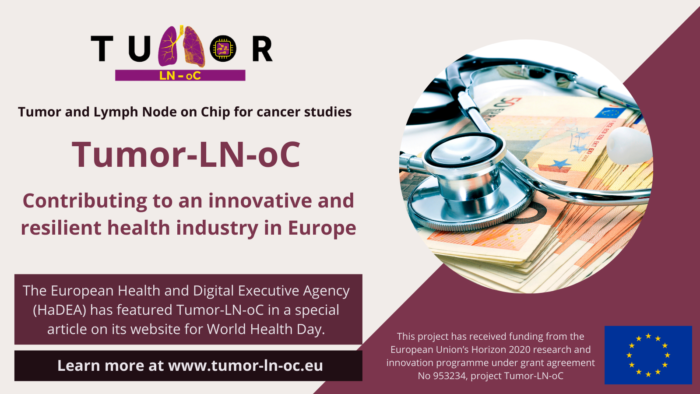Tumor-LN-oC contribution to an innovative and resilient health industry in Europe highlighted for #WorldHealthDay
April 26, 2022The European Health and Digital Executive Agency (HaDEA) has featured Tumor-LN-oC in a special article on its website for World Health Day. The agency underlined the project’s contribution to an innovative and resilient health industry in Europe. World Health Day is a global health awareness day observed annually on April 7th, which marks the anniversary of the founding of World Health Organisation (WHO).
The European Commission is investing in health research, technology and innovation in order to build a stronger European Health Union and strengthen the EU’s autonomy in key strategic value chains for a resilient industry. Technical-scientific projects, e.g. in the field of Organ-on-Chip, such as Tumor-LN-oC, are key to accelerating the green and digital transition. Tumor-LN-oC was highlighted for contributing to the European efforts to an innovative and resilient health industry in Europe by using and strengthening technological developments in the fields of microfluidics, cell biology, cancer biology, physics and computer programming in order to study the metastasis through the lymphatic system and the interaction of primary tumours with LNs.
In particular, Tumor-LN-oC is finding a solution for a robust, automated tumour–lymph node-on-chip platform, which will connect, on a microfluidic chip, human tumour tissues and lymph nodes. It is known that in many cases, tumours use lymphatic vessels to spread and colonise downstream lymph nodes (LNs) – a better understanding of this process is thus key for developing effective therapies. For this reason, the project consortium is developing a microfluidic system which will connect surgically removed, human primary tumours and lymph node tissue from the same lung cancer patient, which will make it possible to offer personalised treatment to lung cancer patients based on the molecular characterisation of their own metastasising cells. Possible application areas of the developed technology include personalised medicine and metastasis diagnosis, as well as drug testing and discovery.
